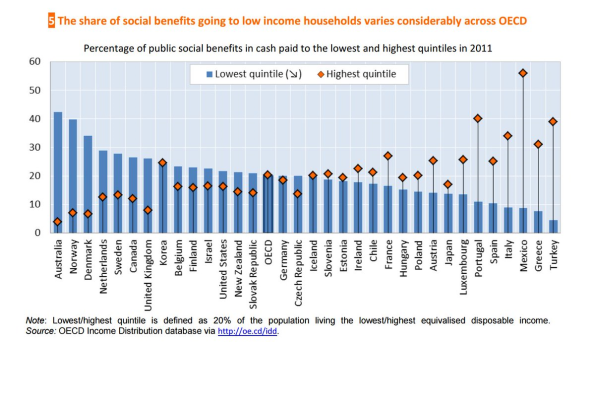Ht graph: @lugaricano The IMF is totally right: the EU is mistreating Greece – and the EU knows. The IMF is also right about this: Greece is – even within its budgetary confines – also mistreating its poor as too much money is flowing to the rich (graph). From the IMF website: The IMF is not demanding more austerity. On the contrary, when the Greek Government agreed with its European partners in the context of the ESM program to push the Greek economy to a primary fiscal surplus of 3.5 percent by 2018, we warned that this would generate a degree of austerity that could prevent the nascent recovery from taking hold. We projected that the measures in the ESM program will deliver a surplus of only 1.5 percent of GDP, and said this would be enough for us to support a program. We did not call for additional measures to achieve a higher surplus. But contrary to our advice, the Greek Government agreed with the European institutions to temporarily compress spending further if needed to ensure that the surplus would reach 3.5 percent of GDP. We have not changed our view that Greece does not need more austerity at this time. Claiming that it is the IMF who is calling for this turns the truth upside down. Making the Greek budget more growth-friendly and fair But this does not mean that there is no further work for Greece to do on the fiscal side.
Topics:
Merijn T. Knibbe considers the following as important: Uncategorized
This could be interesting, too:
tom writes The Ukraine war and Europe’s deepening march of folly
Stavros Mavroudeas writes CfP of Marxist Macroeconomic Modelling workgroup – 18th WAPE Forum, Istanbul August 6-8, 2025
Lars Pålsson Syll writes The pretence-of-knowledge syndrome
Dean Baker writes Crypto and Donald Trump’s strategic baseball card reserve

ht graph: @lugaricano
The IMF is totally right: the EU is mistreating Greece – and the EU knows. The IMF is also right about this: Greece is – even within its budgetary confines – also mistreating its poor as too much money is flowing to the rich (graph).
From the IMF website:
The IMF is not demanding more austerity. On the contrary, when the Greek Government agreed with its European partners in the context of the ESM program to push the Greek economy to a primary fiscal surplus of 3.5 percent by 2018, we warned that this would generate a degree of austerity that could prevent the nascent recovery from taking hold. We projected that the measures in the ESM program will deliver a surplus of only 1.5 percent of GDP, and said this would be enough for us to support a program. We did not call for additional measures to achieve a higher surplus. But contrary to our advice, the Greek Government agreed with the European institutions to temporarily compress spending further if needed to ensure that the surplus would reach 3.5 percent of GDP.
We have not changed our view that Greece does not need more austerity at this time. Claiming that it is the IMF who is calling for this turns the truth upside down.
Making the Greek budget more growth-friendly and fair
But this does not mean that there is no further work for Greece to do on the fiscal side. Greece still needs to reform the structure of its taxes and spending—how the government raises its money and what it spends it on—because both are highly unfriendly to growth and equity. But the point of the measures we are calling for is not to generate more austerity and a higher primary surplus. To the contrary, the gains from these reforms should be used fully to increase spending or cut taxes to support growth
